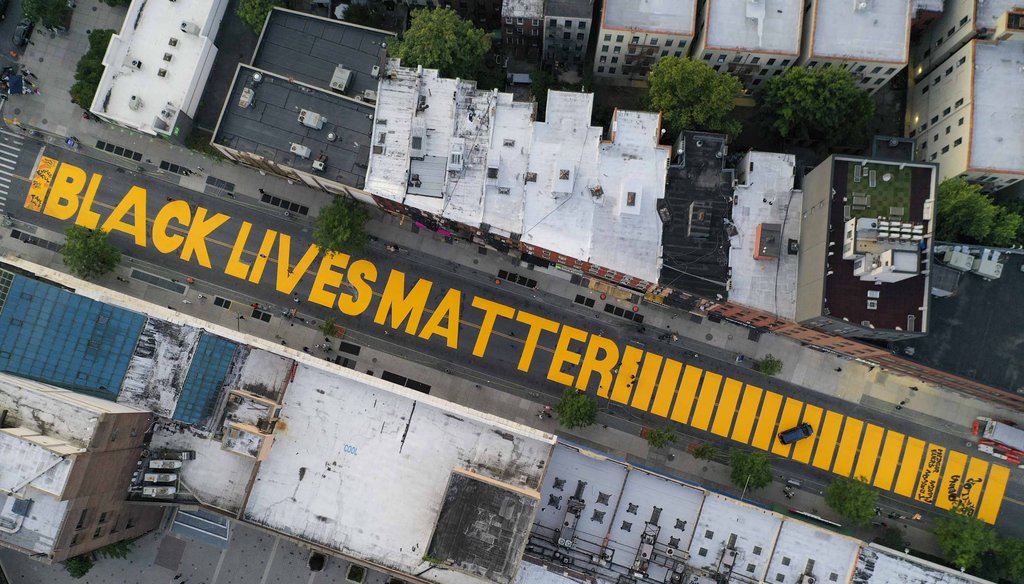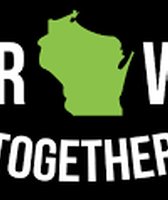Stand up for the facts!
Our only agenda is to publish the truth so you can be an informed participant in democracy.
We need your help.
I would like to contribute

A giant "BLACK LIVES MATTER" sign is painted in orange on Fulton Street on June 15, 2020, in the Brooklyn borough of New York. (AP)
If Your Time is short
-
Black Lives Matter was founded by community organizers. One of the three co-founders said in 2015 that she and another co-founder “are trained Marxists.”
-
Black Lives Matter has grown into a national anti-racism movement broadly supported by Americans, few of whom would identify themselves as Marxist.
Backlash against Black Lives Matter includes branding it as Marxist.
The attack has been made in recent weeks by Rudy Giuliani, President Donald Trump’s personal lawyer; Ben Carson, Trump’s secretary of Housing and Urban Development; conservative talk show host Mark Levin; and PragerU, which has more than 4 million Facebook followers.
Aren’t sure what Marxism is, actually? It was developed by 19th century German philosopher Karl Marx and is the basis for the theory of communism and socialism. "Marxism envisioned the revolutionary overthrow of capitalism by the proletariat (working class people) and eventually a classless communist society," Encyclopedia Britannica and Oxford Reference say.
These days, Marxism usually means analyzing social change through an economic lens, with the assumption that the rich and the poor should become more equal.
In a recently surfaced 2015 interview, one of the three Black Lives Matter co-founders declared that she and another co-founder "are trained Marxists."
Sign up for PolitiFact texts
But the movement has grown and broadened dramatically. Many Americans, few of whom would identify as Marxists, support Black Lives Matter, drawn to its message of anti-racism.
"Regardless of whatever the professed politics of people may be who are prominent in the movement, they don’t represent its breadth," said Keeanga-Yamahtta Taylor, Princeton University African American Studies professor and author of "From #BlackLivesMatter to Black Liberation."
"There are definitely socialists within the movement, as there have been in every single social movement in 20th century American history and today. But that does not make those socialist movements, it makes them mass movements," she said.
In a Facebook post labeling Black Lives Matter as a Marxist movement, PragerU included a video interview with Carol Swain, a Black conservative and former professor at Vanderbilt and Princeton universities. She said, "Now, the founders of Black Lives Matter, they’ve come out as Marxists."
Swain alluded to Black Lives Matter’s three co-founders, who are still featured prominently on the group’s website — Patrisse Cullors, Alicia Garza and Opal Tometi. Their primary backgrounds are as community organizers, artists and writers. Swain, though, was referring to a newly surfaced interview Cullors did in 2015, where she said:
"We do have an ideological frame. Myself and Alicia, in particular, are trained organizers; we are trained Marxists. We are superversed on, sort of, ideological theories. And I think what we really try to do is build a movement that could be utilized by many, many Black folks."
We didn’t find that Garza and Tometi have referred to themselves as Marxists. But the book publisher Penguin Random House has said Garza, an author, "describes herself as a queer social justice activist and Marxist."
Black Lives Matter was formed in response to the 2013 acquittal of George Zimmerman, a neighborhood watch volunteer who fatally shot Trayvon Martin, an unarmed Black teenager, in Florida. The group calls its three co-founders "radical Black organizers."
The project started with a mission "to build local power and to intervene when violence was inflicted on Black communities by the state and vigilantes," the group’s website says. "In the years since, we’ve committed to struggling together and to imagining and creating a world free of anti-Blackness, where every Black person has the social, economic and political power to thrive."
Included on its list of beliefs is one that has drawn criticism as being consistent with Marxism:
"We disrupt the Western-prescribed nuclear family structure requirement by supporting each other as extended families and ‘villages’ that collectively care for one another, especially our children, to the degree that mothers, parents, and children are comfortable."
A spokesperson for Black Lives Matter; Kailee Scales, managing director at Black Lives Matter Global Network Foundation; and the three co-founders did not reply to our requests for information.
"On one level, these are just put downs," University of Massachusetts Amherst economics professor Richard Wolff, author of "Understanding Marxism," told PolitiFact about the attacks on Black Lives Matter.
If people declare themselves Marxists, they are in effect Marxists, but "there really is no standard" of what Marxism is, "there’s no way to verify anything."
It’s important to recognize that movements evolve.
Noting Cullors’ declaration of being Marxist trained, "one has to take that seriously: if the leadership says it is Marxist, then there's a good chance they are," said Russell Berman, a professor at Stanford University and a senior fellow at its conservative Hoover Institution who has written critically about Marxism.
But "this does not mean every supporter is Marxist — Marxists often have used ‘useful idiots.’ And a Marxist movement can be more or less radical, at different points in time," he said.
Black Lives Matter’s "emphatic support for gender identity politics sets it apart from historical Marxism," and the goals listed on its website "do not appear to be expressly anti-capitalist, which would arguably be a Marxist identifier," Berman added.
The group’s support is broad.
Even as some Americans express support for socialism, most view it negatively, and few of the supporters would identify themselves as Marxist.
Meanwhile, 50% of registered voters support Black Lives Matter as of mid-July, up from 37% in April 2017, according to Civiqs, an online survey research firm.
In July, the New York Times reported that Black Lives Matter may be the largest movement in U.S. history, as four polls suggest that about 15 million to 26 million people in the United States have participated in demonstrations over the death of Floyd and others in recent weeks. (That does not account for similar protests overseas.)
"I am fairly convinced these are mostly attempts to smear anti-racist activists. I think in some media, ‘Marxist’ is dog-whistle for something horrible, like ‘Nazi’, and thus enables to delegitimize/dehumanize them," Miriyam Aouragh, a lecturer at the London-based Westminster School of Media and Communication, told PolitiFact.
Black Lives Matter "is not an organization, but a fluid movement; it doesn’t actually matter if one of its founders was a liberal, Marxist, socialist or capitalist."
Our Sources
Facebook, post (archived here; video at 24:15), July 9, 2020
Breitbart, "Black Lives Matter Founder Mentored by Ex-Domestic Terrorist Who Worked with Bill Ayers," June 24, 2020
RealNewsNetwork, Patrisse Cullors interview (7:00), July 23, 2015
New York Times, "Black Lives Matter May Be the Largest Movement in U.S. History," July 3, 2020
Civiqs, "Black Lives Matter — Registered Voters April 25, 2017 — July 18, 2020," accessed July 20, 2020
Encyclopedia Britannica, "Marxism — Top questions, how is Marxism different from other forms of socialism?", accessed July 20, 2020
Black Lives Matter, "Our co-founders," accessed July 16, 2020
Black Lives Matter, "What we believe," accessed July 16, 2020
Black Lives Matter, "Herstory," accessed July 17, 2020
Foundation for Economic Education, "Is Black Lives Matter Marxist? No and Yes," July 7, 2020
Tennessee Star, "Commentary: Black Lives Matter and Its Relationship with Marxism," June 27, 2020
Spiked, "There’s nothing Marxist about Black Lives Matter," July 8, 2020
Google, search of Marxist Alicia Garza Penguin, July 16, 2020
Stanford University Hoover Institution, "The Essence Of Marxism," March 2, 2020
Email, Russell Berman, professor at Stanford University and a senior fellow at its Hoover Institution, who has written critically about Marxism, July 18, 2020
Oxford Reference, "Marxism," accessed July 21, 2020
New York Times, "How Public Opinion Has Moved on Black Lives Matter," June 10, 2020
Email, Miriyam Aouragh, lecturer, Westminster School of Media and Communication, July 21, 2020
Email, Princeton University African American Studies professor Keeanga-Yamahtta Taylor, author of "From #BlackLivesMatter to Black Liberation," July 21, 2020
Interview, University of Massachusetts Amherst economics professor Richard Wolff, author of "Understanding Marxism," July 21, 2020
































